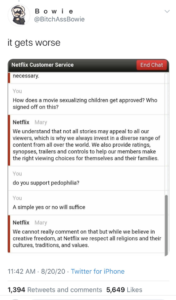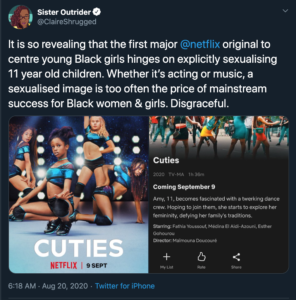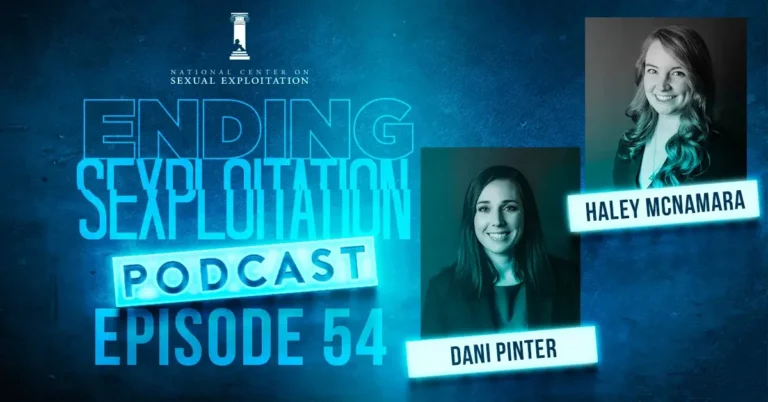Netflix, the global, mega-popular streaming service, recently came under fire for the reveal of their newest film acquisition: Cuties, a French film dedicated to the hypersexualization of young children.
In the now-updated poster and movie description, 11 year old girls pose in tight, revealing outfits on a glittering stage, with one girl even posing on all fours in a sexually suggestive manner. Their faces are sad to see–they look uncomfortable at best, miserable at worst. The description said:
“Amy, 11, becomes fascinated with a twerking dance crew. Hoping to join them, she starts to explore her femininity, defying her family’s traditions.”
.@netflix Your decision to portray children and girls of color through the lens of hyper-sexualization and racist stereotypes in your promotion of 'Cuties' was actively harmful. #DirtyDozenList Share on XAfter instant online outrage at the sexualized poster and marketing (for a movie that claims to be a commentary on the very thing Netflix seems to be selling) Netflix issued an apology. But the apology is not for hosting the film, rather for the “inappropriate artwork” that still passed dozens of levels of approval before launching for the general public to see.
“We’re deeply sorry for the inappropriate artwork that we used for Mignonnes/Cuties,” read a statement posted on the Netflix Twitter account on Thursday. “It was not OK, nor was it representative of this French film which won an award at Sundance. We’ve now updated the pictures and description.” The post was not signed or given further attribution.
Furthermore, when directly asked by a Twitter user regarding the decision-making process behind the release of the movie, Netflix could only give an empty answer when confronted with these issues:

Netflix claims they believe in the “creative freedom” of all religions…since when does pedophilia count as a religion?
The description now reads:
“Amy, 11 years old, tries to escape family dysfunction by joining a free-spirited dance clique named ‘Cuties,’ as they build their self-confidence through dance.”
Regardless of the ultimate messaging behind the film, we believe it is never okay to objectify or sexualize children. Understanding intent may help provide context for creating the right solution to the problem, but “intent” is not the only factor in determining whether something is harmful. For example, “intent” is not able to account for the fact that portraying sexual exploitation can be traumatic and harmful to adult actors—let alone child actors.
Netflix has made it clear that they believe Cuties falls under the increasingly misused label of “empowerment” that is often used to gloss over the blatant objectification of women and, in this case, 11-year-olds.
But what is so empowering about sexualized dance for pre-pubescent girls?
Research has shown the significant detrimental effects that this type of sexualization can have on children. A study on the hypersexualization of children put it this way:
“Many say that the real issue with hypersexualization is the objectification of girls and women. They propose that hypersexualization is not about sexuality but about sexism and about who holds the real power in our world. Objectified girls are being groomed to accept the passive role of object, whose main source of power is her appearance.
Pornography is a big part of the problem, according to some, such as the Réseau québécois d’action pour la santé des femmes. Soft porn images now abound and seem normal in pop culture aimed at teens and tweens.
And some say that it’s all about the bottom line, that, because ‘sexy sells’, the fashion and toy industries are targeting girls for new markets in the same way the tobacco and alcohol industries target adolescents.”
This is not the first time Netflix has attempted to package hypersexualized content of minors in a fun, empowering way. Netflix has been named to NCOSE’s Dirty Dozen List for the past two years for their lack of parental controls (which have improved) and their myriad of graphic and exploitative content scattered throughout the platform.
Netflix shows consistently portray literally thousands of instances of nudity and on-screen simulated sex, as well as instances of gratuitous sexual violence and storylines that normalize themes child sex trafficking.
By depicting these issues so graphically it both increases the likelihood that a victim of past assault will be negatively triggered by the content, and it decreases the likelihood that viewers will thoughtfully analyze the harms of sexual exploitation. It would be easy for Netflix to portray the harms of sexual violence or lack of sexual consent without simultaneously “profiting” from a sexually objectifying and voyeuristic motif.
If Netflix were truly interested in lifting up stories of young children, especially girls of color like Cuties, they could serve to do so without profiting from the same sexually objectifying and voyeuristic motifs that they’ve enjoyed so far.
And it’s no coincidence that this film directly places its young Black stars in the context of hypersexualization.
“Quite sadly, Netflix has given us a clear example of how racist stereotypes and sexual exploitation are connected. ‘Cuties’ clearly sexualizes children, and in particular, girls of color. The pornography industry is built on these stereotypes, and Netflix is taking a page from this playbook by featuring these children in such a manner. Netflix must stop this practice immediately,” said Dawn Hawkins, senior vice president and executive director of the National Center on Sexual Exploitation.
Racism is everywhere in sexual exploitation, and companies like Netflix have an obligation to ensure they are not adding to the subtle and even obvious attempts to include harmful stereotypes in their media.
Addressing sexual exploitation means addressing racism and the systems that allow oppression and marginalization to continue.
It’s sad to see such a powerful company choosing to uphold and promote a film that, regardless of messaging, actively sexualizes real children. And regardless of apologies and quick changes, Netflix is only proving themselves as a company that does not have the right or appropriate safeguards in place to ensure these types of decisions don’t make it to final review.

A sexualized image should never be the price for mainstream success in media, and it certainly shouldn’t be spreading so low as to affect 11 year old children in the process.
To read more about the Netflix problem, visit our Dirty Dozen page here. Read more about the harms of sexualized children’s dance and what you can do to help here.



